| This blog explores social attitudes in Jane Austen's time, discusses her novels, reviews forgotten 18th century novels, and throws some occasional shade at the modern academy. The introductory post is here. My "six questions for academics" post is here. |
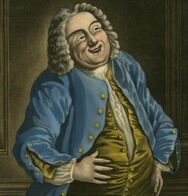 "Laugh and grow fat," print by Richard Purcell, British Museum
"Laugh and grow fat," print by Richard Purcell, British Museum As I discovered, the Georgians loved riddles with witty word play. They could be in prose, but a really clever riddler could give his clues in rhyme, as the author of the Kitty riddle does. Riddles were sometimes called "Enigmas."
Many Georgian-era riddles were cleverly risqué but Mr. Elton, when asked to contribute to Harriet's riddle collection, was careful to avoid giving her something that was off-color. He was "most earnestly careful that nothing ungallant, nothing that did not breathe a compliment to the sex should pass his lips. They owed to him their two or three politest puzzles." The passage acknowledges the changing sensibilities of Regency audiences, compared to the bawdier Georgians.
Below is a prime example of a naughty-sounding Georgian riddle. I wouldn't share this one with children, even though the allusions are likely to go over their heads...
A. "A strange thing hangs under a man's clothes. It is long and firm, pierced in front, and has a good fixed place. When a man lifts his garment, it is because he wishes to visit the head of this dangling instrument with the familiar hole which it, when of equal length, has often filled before." (thanks to Puzzling Stack Exchange) (answers to riddles at end of post)
A clever riddler would have turned this into a poem: Hidden am I, but not from displeasure/ my owner employs me to access rare treasure, etc.
This is one of many examples of a riddle where the clues point you in one direction, but the answer is something else. This is true of 'Kitty, a Fair but Frozen Maid" as well.
"Kitty, a Fair but Frozen Maid" is not the only poem-riddle from this era which mentions Cupid, and I'll share several more in this post. In this case of the following riddle by the Rev. BTH Cole, Rector of Warbleton, Sussex, the reader is tipped off in the second stanza that "Cupid" is not the correct answer. The enjoyment of the poem comes in appreciating the many faux comparisons the writer makes between Cupid and--what the riddle is actually about.
| B | Blithe Aphrodite, ever young Was shaped from the foam of sea Of purer crystal I am sprung, And smoother streams have fashioned me. Cupid and I both bend our bows By Beauty’s temples both incline He o’er his eyes a bandage throws; A twofold lustre gleams in mine… A quiver on his shoulder shines, In rattling case my powers I hide; In couples, he the young confines, In pairs, a graver throng I guide. Of him let head-long passion learn; Philosophy learns much through me. Can you not yet my name discern-- I’ve help’d you, I suspect, to see? |
Shortz quotes the Kitty riddle in full in his article as an example of a riddle that describes "a situation rather than an object," namely, that a maid has set the chimney on fire. The author also calls the riddle "enigmatic," noting that "many of the lines of the verse have double meanings." The entire article is here as a pdf with additional examples of Georgian riddles.
Emma tells her father that she and Harriet copied "Kitty, a Fair but Frozen Maid" into Harriet's riddle-book from the Elegant Extracts. But pioneering Austen scholar R.W. Chapman ascertained that the poem does not in fact appear in any edition of the Elegant Extracts. We can speculate about why Austen has Emma say that it came from the Elegant Extracts, but we can never know for sure. The Elegant Extracts featured selections of poetry, but the editor, Vincemus Knox, did not choose much in the way of riddles. He published a tongue-in-cheek defense of riddles taken from Fitzosborne's Letters. And when he did print an assortment of riddles attributed to Dr. Swift and his friends, he posted the answer to the riddle as the title, thus giving away the answer before one had even read it. I'm just speculating here, but does that de-emphasize the riddling aspect of the poem in favor of emphasizing the cleverness of the poem? Here is one of those riddles but I have omitted the title so you can have a chance to guess it. The answer is below.
| Though I, alas! A prisoner be, My trade is, prisoners to set free. No Slave his lord’s commanding obeys With such insinuating ways. My genius piercing, sharp, and bright, Wherein the men of wit delight. The clergy keep me for their ease, And turn and wind me as they please. A new and wondrous art I show Of raising spirits from below; In scarlet some, and some in white; They rise, walk round and never fright. In at each mouth the spirits pass Distinctly seen as through a glass O’er head and body make a rout, And drive at last all secrets out: And still, the more I shew my art, The more they open ev’ry heart. A greater chemist none than I, Who from materials hard and dry Have taught men to extract with skill More precious juice than from a still. Although I’m often out of case, I’m not ashamed to shew my face. | Though at the tables of the great I near the side-board take my seat; Yet the plain squire, when dinner’s done Is never pleas’d till I make one: He kindly bids me near him stand; And often takes me by the hand. I twice a day a-hunting go; Nor ever fail to seize my foe; And, when I have him by the pole, I drag him upwards from his hole; Though some are of the stubborn kind, I’m forc’d to leave a limb behind. I hourly wait some fatal end; For I can break, but scorn to bend. |
| D. Enigma VI by Fisher Wells, Esq. I never am bashful with courtiers, or kings, But give every comer as good as he brings; When consulted, my answers are usually clear; Tho’ I’m apt to be dull when my friends are too near. If I flatter at times, ‘tis in hope of no fee; For pleas’d, or displeas’d, ‘tis indifferent to me: If they smile, so do I; if they frown, tis the same: Now look with attention, and tell me my name. E. Another Riddle that Sounds Naughty My lady has a thing most rare Round about it grows much hair, She takes delight with it in bed, And often strokes its hairy head. |
| F. Another riddle with a Cupid Just as with the Kitty riddle, we have Cupid mounting in air and the riddler tells us the answer is not Cupid. I saw a child--a fillet’s* force Gently compressed his curling hair; He poised his arms—then, took his course, And mounted presently in air. There round him he annoyance hurled And, as he proudly strode on high, Triumphant, menaced all the world, And seemed as he would scale the sky. Who was it? But you’ll guess in vain-- Here would the wisest appear stupid-- Well, have you found it? Guess again-- Still are you wrong—it was not CUPID. *a band or ribbon worn around the head, especially for binding the hair. |
I haven't found an answer, but according to the rules of Georgian riddles, the answer is not what you're thinking.
| Diarian nymphs, I, with no hostile view In mystery veiled, present myself to you Tho’ loveliness I boast, forbear alarms, Since I more potent render all your charms. Where the bright Paphian queen, in beauty’s pride, Where Cupid and the graces too reside. There, with Aurora’s blushing tints I glow, On the banks of lillies, fair as virgin snow. I, like refulgent Sol, in splendor reign, When from his lofty height he views the main.. (yada yada more classical allusions) ...Unrivalled is the mighty power I hold, The high, the low, the coward and the bold, | All equal honor, equal homage, pay Yet I’m unconscious of my sovereign sway Great is my modesty, myself I screen, And by the public eye am seldom seen Small is my bulk, I happily agree, In size and shape with the sweet raspberry; Likewise from me a nectar oft proceeds, That far the nectar of the gods exceeds. A little more I’ll add, then bid adieu, Ye maids divine, I am a part of you: And man without me would not wish to live; I and my fair ally such rapture give. |
I am not an expert on Georgian riddles and charades, but I think you don't need to look at many of them to realize that they are written with a specific answer in mind and are not intended to be open to multiple or subjective interpretations.
Take the oral riddle, "What's black and white and red [read] all over?" The intended answer is "a newspaper," but a later, more vulgar wag added a new answer: "a nun falling down the stairs." Is it valid to claim that the author of the riddle really meant for us to think of royalists, fascists and communists? Or are we projecting our own meaning? (Actually, there's a Wikipedia entry about this riddle!)
| The pleasure of the Georgian riddles derives from the cleverness of the hints, and the skill displayed in giving those hints in metered rhyme. Swift, as we saw above, can go on and on (and on) with the clever rhyming hints. The "naughty" ones also give pleasure because they trick you and you laugh at the banality of the answer. These riddles hint but they do not allude, vaguely, to metaphorical meanings, or contain multiple meanings. Therefore—to mix my own metaphors—I think plumbing "Kitty, a Fair but Frozen Maid" for hidden meanings about venereal disease, prostitutes, and the mercury smoke cure is barking up the wrong tree, as I discuss in my Persuasions article. | H. Another naughty Georgian riddle (thanks to Eros Revived), What’s that in which good housewives take delight, Which, though it has no legs, will stand upright, Tis often us’d, both sexes must agree, Beneath the navel, yet above the knee… The women love to wriggle it to and fro, That what lies under may the wider grow… Now tell me, merry ladies, if you can, What must this be, that is no part of man? |
| Here's a riddle that appears in a 1794 jokebook that also includes a three-stanza version of the Kitty riddle. The frontispiece of the book shows a family sitting around of an evening, playing at solving riddles. This riddle is another riddle that sounds salacious, but is not. | I. I’m of the same materials as you, Have native ignorance and beauty too; But when I fly for safety to your arms, You to a foreigner resign my charms, He to defile me thinks it no offence, And rudely robs me of my innocence; With inward rage I burn, but hug the foe, And breath out vengeance whereso-er I go, Nay while thus lovingly we seem t’agree, I serve him just as Jove did Semele, For ere from me the thoughtless sot retires, By my embrace consum’d he soon expires. |
| I confess that when I read these 18th century riddles and charades, I feel as dim as Harriet Smith: “What can it be, Miss Woodhouse?—what can it be? I have not an idea—I cannot guess it in the least…” What's the answer to this charade by David Garrick? The answer is a word with two syllables, but what is it? J. My first is nature’s gayest time The second oft conceals a beast When joined they make, when in its prime, For Kings and emperors a feast. |
| Answers to riddles: A. A key B. A pair of spectacles. C. A corkscrew. D. When prais’d by a flatterer, who term’d me divine, Sure beauty uncommon, I thought, must be mine! Elated with pride, to the Mirror I ran; But the Mirror, alas! Was sincerer than man. No charms, no divinity, there could I find; I’ll strive then to please, by improving my mind. E. A lapdog. F. My guess is "shuttlecock" but I don't know for sure. G. Ummm.... a kiss? French kissing? Is the "fair ally" the tongue? H. A rolling pin I. A tobacco pipe J. Springcave? Mayden? What can it be, Miss Woodhouse? | More background: - Examples of 18th century love poetry which use "flames," "bleeding," "victims," etc. The Kitty riddle, its authorship and variations on the riddle Previous post: Of Cupids and Chimneysweeps Next post: "Astonished at what I hear" Modern academia on Jane Austen's beliefs. |
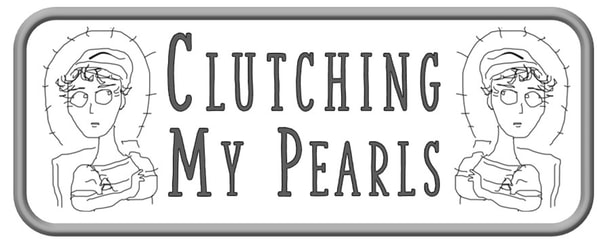
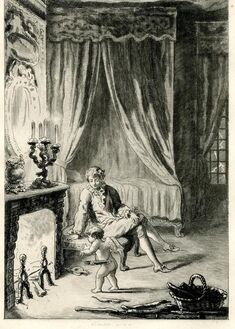
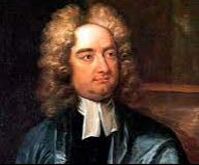
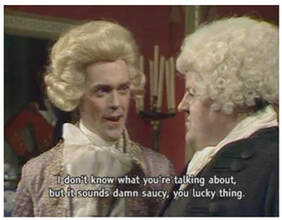
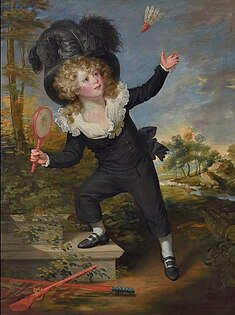
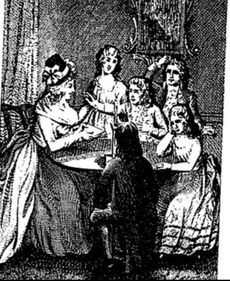
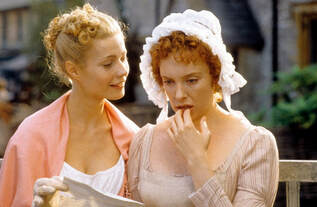
 RSS Feed
RSS Feed